AALP Class 20 - Toronto Seminar
Date: January 22, 2024
Author: Janelle Cardiff and Brandon Fakelman, AALP Class 20
Day 1 – January 17, 2024
Guest Speaker- Kezia Cowtan, Project Manager, Rural Ontario Institute- A case study in project management: Rural Housing and Information System
Kezia joined us virtually to discuss in detail the steps of project management as she experienced firsthand with her project manager role in the creation of the Rural Housing and Information System (RHIS). As she went through the stages of project management, she referenced the real-life situation that she faced during the project, she outlined issues, timelines, delays, and various pressures people involved in the project faced. This project was developed out of need and provides great connections between resources required to effectively serve rural housing needs. Kezia also let us know that the project manager must be able to wear all hats during the project.
Guest Speaker- Mike McMorris, CEO, Livestock Research Innovation Corporation- Alternative Proteins
Mike joined us virtually he outlined that there are three protein sources livestock, plants, and cellular agriculture. Traditional meat companies have started to invest in plant-based meat, as well as cell-based proteins as the populations view on livestock agriculture being a large greenhouse gas emitter continues to increase. He discussed that different parts of the world are at different stages of adoption into cellular agriculture mainly based on the countries need. He gave the example of Singapore investing $30 billion dollars into this sector as its current food production capabilities are low compared to their needs. They have invested this money with the goal of providing 30% of their own country’s food and they already have a cell based “chicken nugget” on the market.
Mike also talked to us about his life experiences and his thoughts around creating a good life. He discussed the differences between going through change you can control vs going through change you cannot control; if we choose the change, we move along fast but tend to resist change we cannot control. Mike encourages change within organizations as a method to keep thinking fresh and new ideas moving. He gave advice about working with others and helping to elevate the people around you, this will stick with them more than anything you could do.
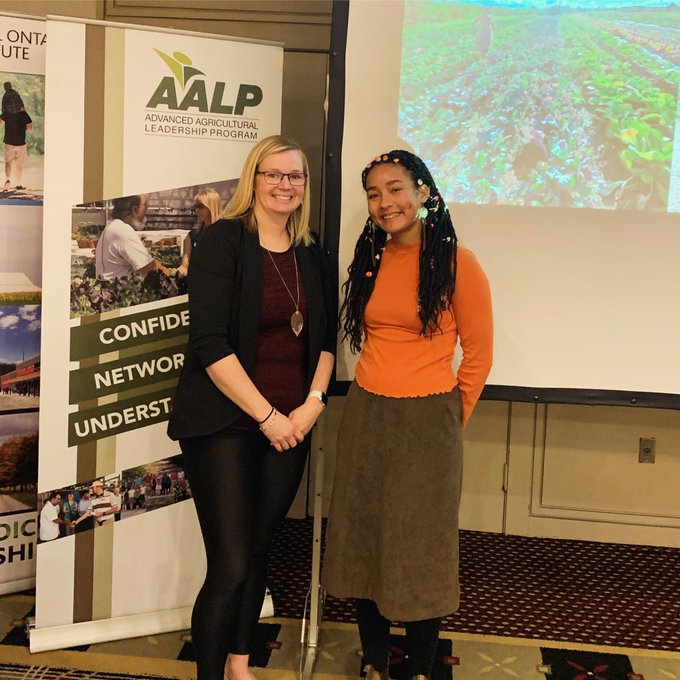 Guest Speaker- Cheyenne Sundance, Founder, Sundance Harvest and Co-Founder of Sundance Commons- Providing land access, training, and community for new farmers on the margins.
Guest Speaker- Cheyenne Sundance, Founder, Sundance Harvest and Co-Founder of Sundance Commons- Providing land access, training, and community for new farmers on the margins.
Cheynne joined us to discuss the work of Sundance Harvest and Sundance Commons as they work towards giving land access, training, and a method of sales all to individuals who do not have any method of access to land. They currently have four sites; the larger equipment items are shared, and access given to their growers at no cost. Community members work towards training each other given their experiences. Cheynne also shared that a very high level of cooperation within the organization is necessary in order to achieve individual and collective goals. It gives her great excitement to see the growth in the individuals over the years as through mentoring each other and working together they have managed to continue to grow each year.
Guest Speakers- Dr. Laura Van Eerd, Professor of Sustainable Soil Management at the University of Guelph Ridgetown Campus, Dr. Erin Nelson, Associate Professor, Department of Sociology & Anthropology, University of Guelph, Dr. Heather White, Knowledge Mobilization & Communications Coordinator, Soil at Guelph, Jenna Livingston, MSc in Landscape Architecture at University of Guelph, Paige Allen, Provincial Coordinator, Ontario Soil Network- Soil Health: Who’s talking about it? How do we talk about it? A session to co-create knowledge.
Representatives from the Weston Family Soil Health Initiative joined the AALP class to gather input as a focused study group to discuss some initial questions about soil health to help steer conversations and methods about soil health in the right direction. We were split up into groups, one group with each guest to answer who is talking about soil health and how are we talking about it. Our group’s initial discussion showed that small conversations are being held across the agricultural network at varying levels. Upon reflection the group felt that agronomists tend to discuss soil health in greater detail, whereas financial services and insurance were only lightly discussing the issue of soil health. We further discussed what would be holding back these discussions and a common theme seemed to focus on short term financial performance and varying definitions of what healthy soil is. Our group also found that across the agricultural network the discussion of soil is not always focused on soil health.
Day 2 - January 18, 2024
Day 2 of our seminar began with a sponsor spotlight presentation from Greg Deitrich and Renee Bronkhurst featuring Chicken Farmers of Ontario. There are 1300 chicken farms in Ontario which is 35% of the chicken production across Canada. This industry is supply managed which means the production assigned nationally via ‘quotas’ to farmers is based on consumer demand of the product. Our session then moved into a panel discussion on capital markets where Jeff McAllister welcomed 3 panelists; Andrew Muirhead (Origin Merchant Partner), Sam Doyle (Bonnefield) and Bernice Miedzinski (StarBridge Capital). All three individuals work in the investment world and work with business owners to provide business strategy to help drive success, equity capital to help grow the business or find investors across the world. It was a common trend that partners or investors get excited about farmland or farm businesses because of the permanence of it. There is also much opportunity still on the ag processing side of things but we as Canadians need to approach these possible success opportunities with confidence and not wait for other countries to try things first.
.jpg)
.jpg)
Our class then headed out on foot towards Queen’s Park also know as the Pink Palace because it is made of Credit Valley limestone. MPP Stephanie Bowman greeted us with a talk about how so many things are integrated within our ag industries which presents many opportunities to think of issues in a collaborative way, especially when 80% of the grade A farmland in Canada is in SW Ontario. A key message shared when creating policy is that it is important to get input from experts and people that may challenge your opinion. AALP graduate and MPP Lisa Thompson is the 40th Ag Minister in Ontario and found this to be ironic that we are also celebrating the 40th anniversary of the AALP program this year. Lisa shared many insights for our class to encourage us to get the most out of our AALP experience as possible. Her number one greatest benefit of the program personally was the network of people within her class. She also encouraged us to gain appreciation for how to implement change to affect policy in the future. Given the global perspective, it is important to look beyond the borders and be a leader to seed change since many people are looking at Ontario as a leader in the ag industry. Ontario is also the hub of food and beverage manufacturing in Canada which presents some interesting opportunities as well. To continue down this road of success Ontario needs to continue using innovation and bringing in talented people.
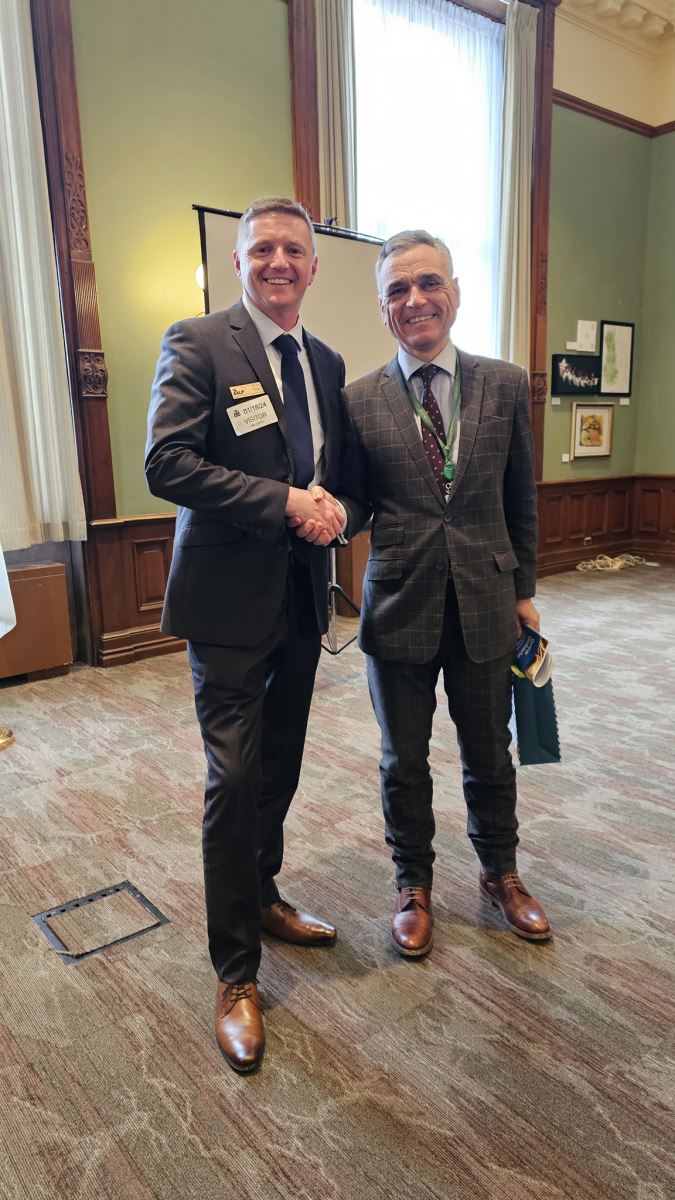 Next, we met with Robert Benzie who works for the Toronto Star as the Queen’s Park Bureau Chief reporter. It was an eye-opening opportunity to ask Robert some questions about the spread of misinformation and how easily this can happen during an interview. Our class left with some great tips on how we can start to encourage the good news stories in agriculture to get some traction within the media. Class 20 member Lauren Kennedy then gave our class a quick lobbying 101 presentation where we learned how to gain relationships with various politicians and also how to push forward certain issues within our industry that may require changing policy. After a beautiful tour of Queen’s Park we had the opportunity to ask Lisa Thompson’s directors, Lindsay Smith and Ryan Puviraj, a few questions. They shared the importance of outreach and communication as well as collaboration between industry and parliament. An open and candid relationship is what helps drive change in policy. Before we capped off our day we had our Grid Works finale with Gavin Robinson where our groups reviewed how the gridworks information has been helpful and what sort of changes they have implemented based on the group feedback last seminar. Behavioural modification is possible but it takes time. Remember to be accountable to AALP and to our class, participate in the critique discussions and ask questions!
Next, we met with Robert Benzie who works for the Toronto Star as the Queen’s Park Bureau Chief reporter. It was an eye-opening opportunity to ask Robert some questions about the spread of misinformation and how easily this can happen during an interview. Our class left with some great tips on how we can start to encourage the good news stories in agriculture to get some traction within the media. Class 20 member Lauren Kennedy then gave our class a quick lobbying 101 presentation where we learned how to gain relationships with various politicians and also how to push forward certain issues within our industry that may require changing policy. After a beautiful tour of Queen’s Park we had the opportunity to ask Lisa Thompson’s directors, Lindsay Smith and Ryan Puviraj, a few questions. They shared the importance of outreach and communication as well as collaboration between industry and parliament. An open and candid relationship is what helps drive change in policy. Before we capped off our day we had our Grid Works finale with Gavin Robinson where our groups reviewed how the gridworks information has been helpful and what sort of changes they have implemented based on the group feedback last seminar. Behavioural modification is possible but it takes time. Remember to be accountable to AALP and to our class, participate in the critique discussions and ask questions!
Day 3 - January 19, 2024
Site Tour Day
At the crack of dawn on an icy cold day 3, coffees in hand, our class boarded the bus and sped down the Gardiner Expressway towards the Ontario Food Terminal. The terminal vendors were separated into two sections, 20 long term international business’ and then the Farmers Market area with local Canadian or Ontario product outside in the parking lot. Buyers then wander the halls shopping, tasting and negotiating prices before heading home with either a full transport truck or just a box of bananas. Buyers range from chefs to small/medium sized stores. Larger grocery retailers would only ever need the food terminal for filling shorts. We were surprised to see no use of computer systems for tracking because of fear of breakdown in such a fast paced market. The food terminal is owned by OMAFRA and a provincial board is set to oversee the operation. While half of our group toured the terminal and the other half went to Second Harvest. Second Harvest rescues surplus edible food that other business’ cant use and through their network get it to people in the community that need it. They are Canada’s largest food rescue organization that work towards responsible food consumption and production, keeping good food out of landfills to reduce greenhouse gases and help reduce hunger in the community. There is a kitchen division that prepares nutritious meals for the community and also supports less fortunate kids with lunches during the June to September summer break. Last year along Second Harvest rescued 36 million pounds of good food, that is $118 million dollars worth of food redistributed!
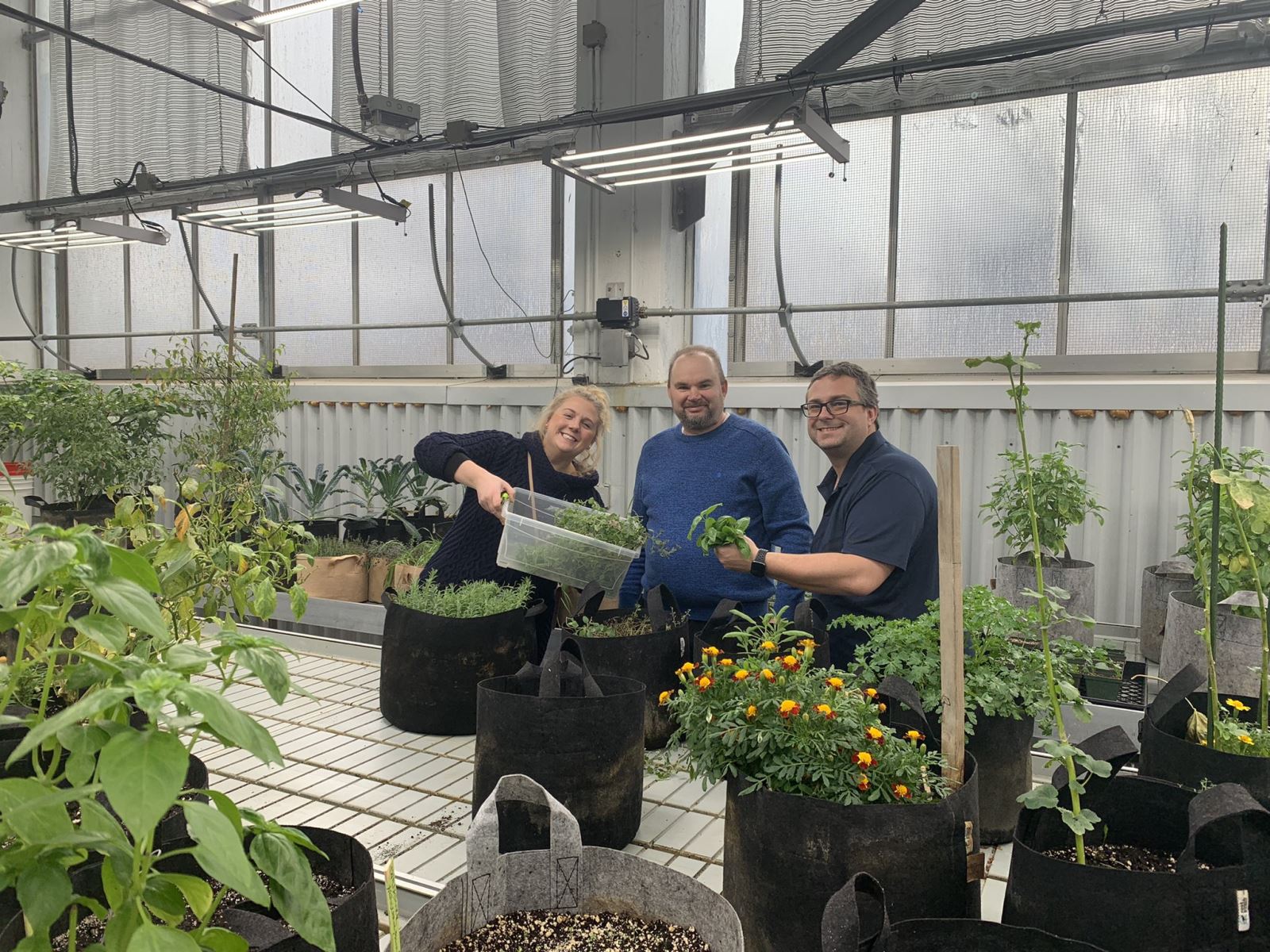
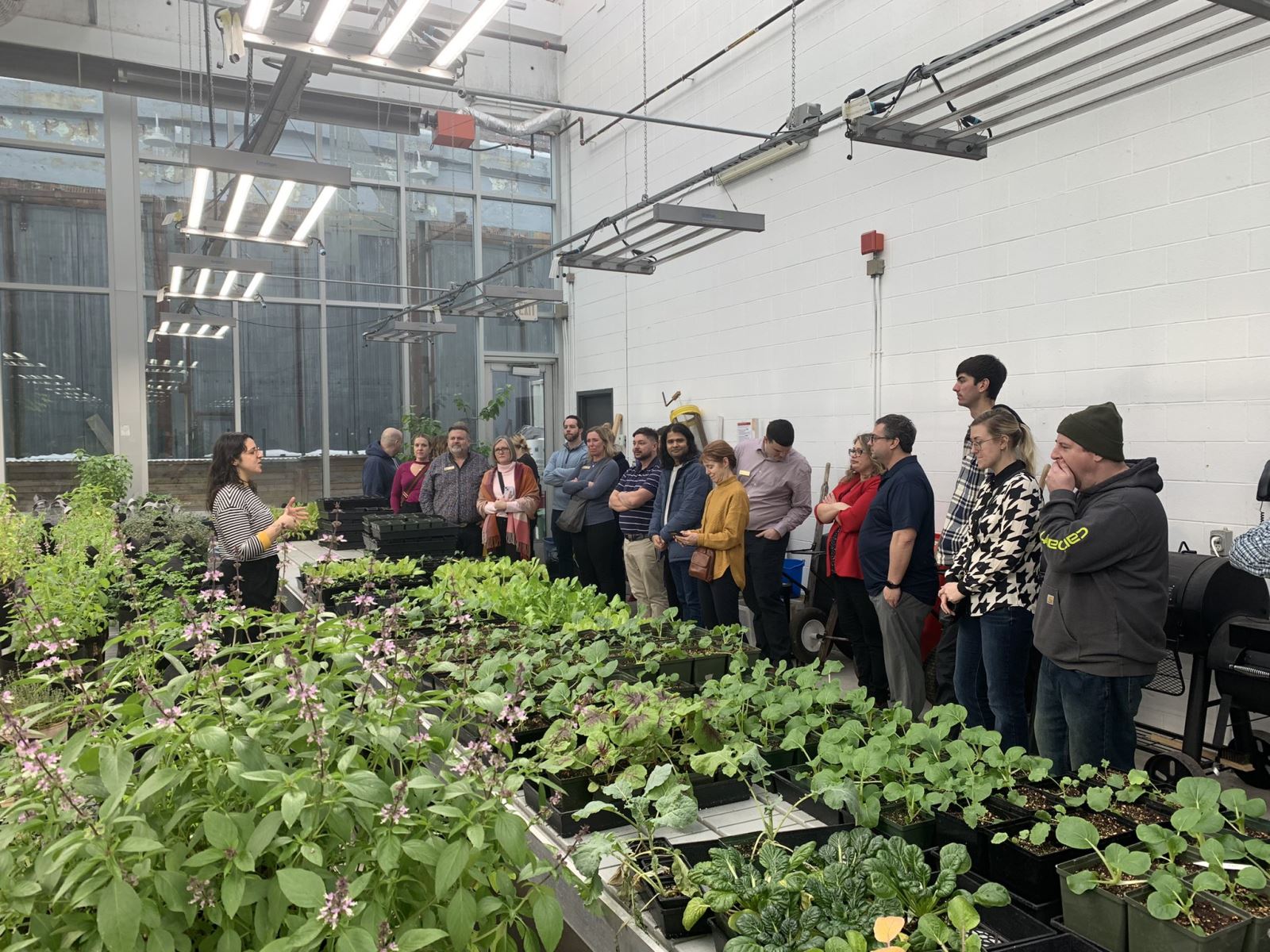
Next we visited The Stop Community Food Center Green Barn where there is a small green house, outdoor garden space and community kitchen. The Stop is a place where community members can grow and feel supported where they are, as they and as their circumstances change. They provide anything from prepared meals to perinatal support. Their model aims to address the effects and root causes of food security and marginalization. Our class then volunteered helping the group wash dishes, wash green house equipment and prepare seedling labels for the spring growing season. For lunch our bus dropped us at the St. Lawrence Market where our class explored and eagerly learned about the local vendors while finding food items they had never tried before.
Kelly Ann McKnight and George Pinho from StoneRridge Consulting met with our class back at the hotel to reveal our DiSC personality testing results. It was interesting to learn to about the 4 different personality categories (Dominant, Influence, Steadiness and Conscientiousness). We also learned how to work and communicate best with other personality types based on what those individuals value most. These results reveal a natural personality type however there may be behaviours that have been adopted to help someone in other areas of their life or work to allow success. All 4 DiSC personality types can be wonderful leaders with the right 9,9 gridworks behaviours to compliment.
Day 4- January 20, 2024
Guest Speaker- Ryan Carlow, Greenbelt Foundation- Soil Health in Ontario’s Golden Horseshoe
Ryan spoke to us about soil health in Ontario’s Goden Horseshoe as 40% of the area is used for agriculture. Ryan also represents the Greenbelt Foundation who are the soil specialists of the Greenbelt. Farming in the Greenbelt varies by each region and soil type, and soil health looks different across these areas. The purpose of the Greenbelt Foundation is to increase the numbers of farmers using best management practices. They aim to build consensus and develop scalable methods to test soil and promote these best management practices.
Guest Speaker- Ralph Christian Delos Santos, Cofounder & CEO of Biofect Innovations- From Lab to Table: Precision Fermentation and the Creation of Sustainable, Healthier Sugar Alternatives and Ingredients with Biofect Innovations
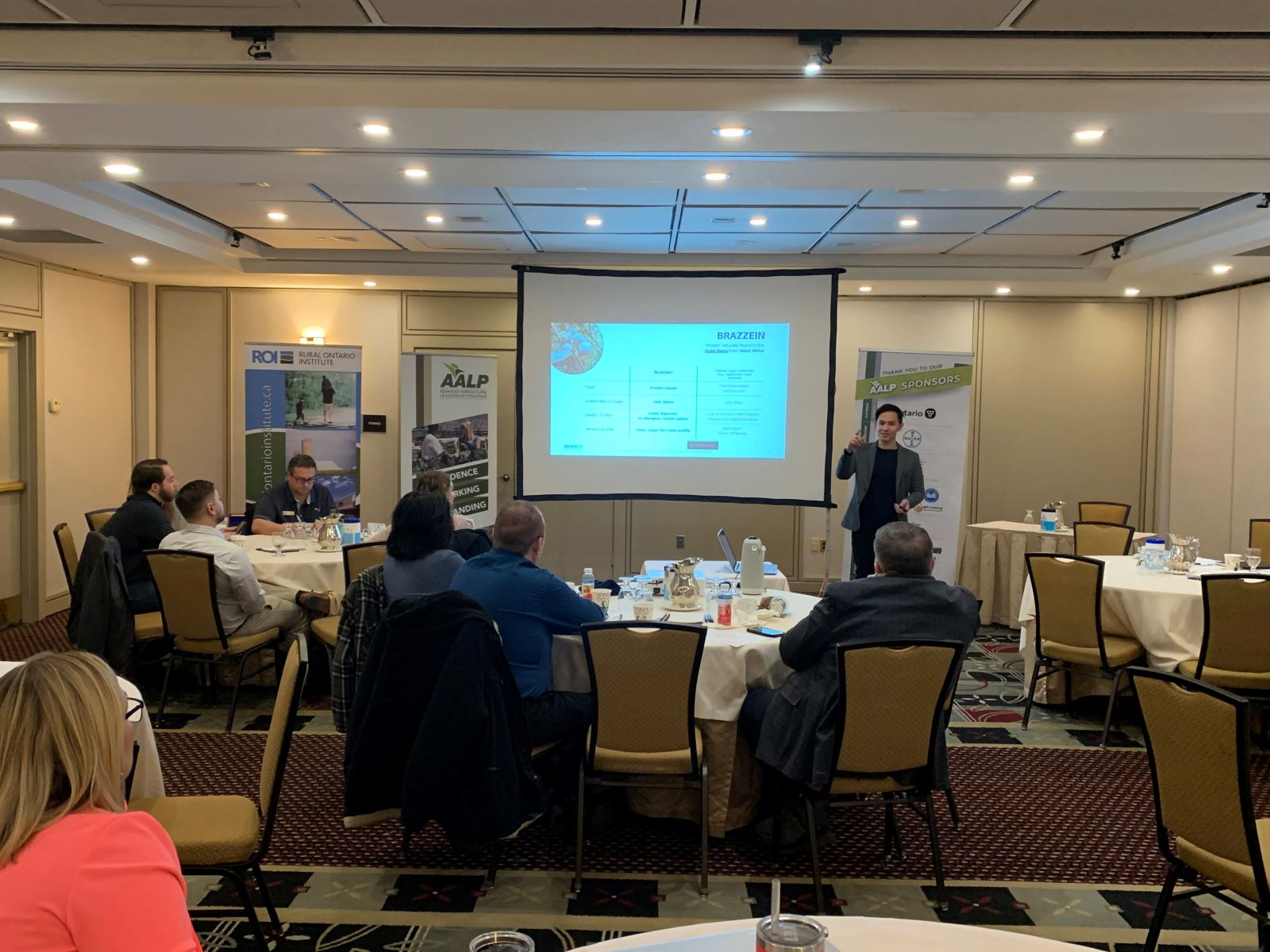
Christian joined us to talk about the company he co-founded Biofect Innovations, and the work they are doing towards developing sustainable healthy sugar alternative. Currently his work surrounds the precision fermentation method to produce brazzein, a sugar molecule found inside of the Oubil berry grown in West Africa. Since this sugar is protein based it’s sweeter than regular sugar, easier to digest, not susceptible to allergies and does not cause spikes in insulin with a clean and sugar like taste profile. The brazzein protein shows great promise in reducing agricultures greenhouse gas emissions, while contributing to increasing the health of citizens.
Share: